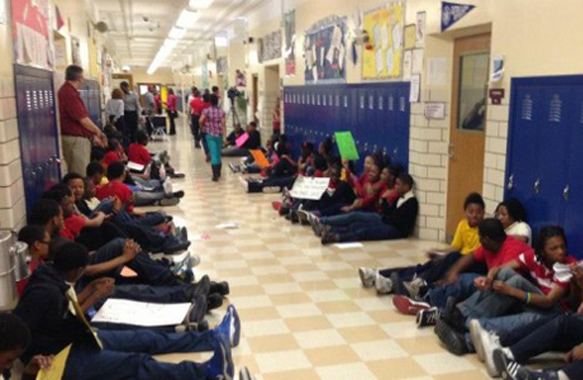By Jessica Shiller | Learning on the Edge July 29, 2013 | Students stage a sit-in at Williams Elementary (Credit: OccupyCPS)
The battles over school closings have been fierce nationwide. In Chicago, Philadelphia, New York, Detroit, Baltimore, and Los Angeles, announcements of public school closings have been met with protest. Urban district leaders have been steadfast, insisting that failing schools must be closed to be able to provide higher performing school options. As Rahm Emmanuel, mayor of Chicago, has said, “The decision to deal with the 54 schools was not taken lightly but it was taken with the notion of ‘How do we make sure that every child can get to a quality school with a quality education?’ Because you do not get a repeat on this.”
We can’t leave urban public education to the whims of the market.
Moreover, closing schools may not even save money. An audit of school closings in Washington, D.C., schools showed closures costing, rather than saving the district money
Related Read Market-Oriented Education Reforms’ Rhetoric Trumps Reality
So, why do it? Randi Weingarten, president of the American Federation of Teachers, speculates, “It is clear to us that this massive plan to close schools has nothing to do with the education of the children.” She’s right. Closing schools is part of a larger agenda that reformers have had for urban districts. In a 2010 manifesto entitled “How to Fix Our Schools”, urban district leaders including Michelle Rhee, Philadelphia schools superintendent Bill Hite, and former NYC schools chancellor Joel Klein put forth a vision of a school system guided by market ideology, not research.
One of their main strategies for improving schools is closing schools whose students don’t perform well on exams, and open charter schools in their place. As the manifesto explained, “We must give parents a better portfolio of school choices. That starts with having the courage to replace low-performing schools and making charter schools a truly viable option.” This strategy ignores research and defines schools as products that parents select in the school marketplace rather than defining schools as community institutions.
Choice sounds good, but not everyone will have great school choices, as the studies in Philadelphia and Chicago have shown. And, even if excellent school options were put in place, not everyone will be able to take advantage of the choices in the school marketplace. Every marketplace has shoppers who can take advantage of the market’s choices and those who can’t. This isn’t good enough. We can’t leave urban public education to the whims of the market. We need a system that guarantees a great education for all students.
Related Read Why?
Jessica Shiller is an assistant professor of instructional leadership and professional development, Towson University, Towson, Md. Her last Kappan article was “Venture philanthropy’s market strategies fail urban kids,” Phi Delta Kappan, May 2012 (Vol. 93, No. 8), pp. 12-16.
This piece was reprinted by EmpathyEducates with permission or license. We thank the Author












Leave A Comment